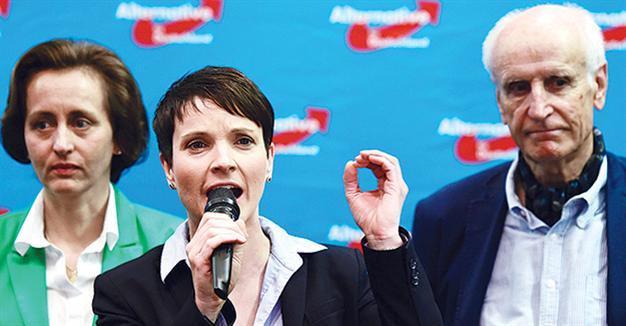Nationalists strong, setback for Merkel party in German vote
BERLIN – The Associated Press

AFP Photo
A nationalist, anti-migration party powered into three German state legislatures in elections on March 13 held amid divisions over Chancellor Angela Merkel’s liberal approach to the refugee crisis. Merkel’s conservatives lost to center-left rivals in two states they had hoped to win.
The elections in the prosperous southwestern state of Baden-Wuerttemberg, neighboring Rhineland-Palatinate and relatively poor Saxony-Anhalt in the ex-communist east were the first major political test since Germany registered nearly 1.1 million people as asylum-seekers last year.
The three-year-old Alternative for Germany, or AfD - which has campaigned against Merkel’s open-borders approach - easily entered all three legislatures.
AfD won 15.1 percent of the vote in Baden-Wuerttemberg, official results showed. It scored about 12.5 percent in Rhineland-Palatinate and 24 percent in Saxony-Anhalt, where it finished second, according to projections by ARD and ZDF television with most districts counted.
“We are seeing above all in these elections that voters are turning away in large numbers from the big established parties and voting for our party,” AfD leader Frauke Petry said.
They “expect us finally to be the opposition that there hasn’t been in the German parliament and some state parliaments,” she added.
There were uncomfortable results both for Merkel’s conservative Christian Democratic Union (CDU) and their partners in the national government, the center-left Social Democrats (SPD). The traditional rivals are Germany’s two biggest parties.
“The democratic center in our country has not become stronger, but smaller, and I think we must all take that seriously,” said Vice Chancellor Sigmar Gabriel, the Social Democrats’ leader.
Merkel said after the difficult election that she remains convinced there has to be a European solution to the migration crisis, and it will take time.
Merkel made clear she will not change course.
“I am firmly convinced, and that wasn’t questioned today, that we need a European solution and that this solution needs time,” Merkel said on March 14.
She acknowledged that the refugee issue dominated three state elections and that many voters felt there is no satisfactory solution yet.
Merkel’s party kept its status as strongest party in Saxony-Anhalt. It had hoped to beat left-leaning Green governor Winfried Kretschmann in Baden-Wuerttemberg, a traditional stronghold that the CDU ran for decades until 2011. It also hoped to oust Social Democrat governor Malu Dreyer from the governor’s office in Rhineland-Palatinate.
However, the CDU finished several percentage points behind the popular incumbents’ parties in both states and dropped 12 percentage points to a record-low result in Baden-Wuerttemberg, with 27 percent support.
The Social Democrats suffered large losses in both Baden-Wuerttemberg and Saxony-Anhalt, where they were the junior partners in the outgoing governments, finishing behind AfD.
Other parties will not share power with AfD, but its presence will complicate their coalition-building efforts.
In all three states, the results were set to leave the outgoing coalition governments without a majority - forcing regional leaders into what could be time-consuming negotiations with new, unusual partners. Merkel’s CDU still has a long-shot chance of forming an untried three-way alliance to win the Baden-Wuerttemberg governor’s office.
Germany’s next national election is due in late 2017.
